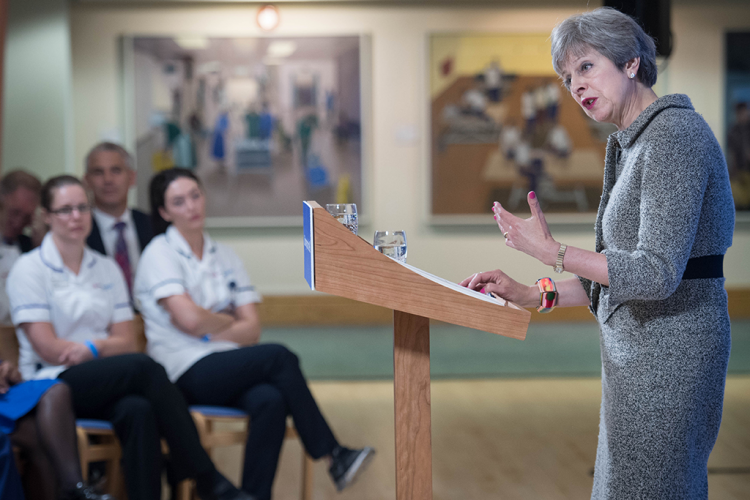Theresa May’s NHS funding pledge: what we know and what we don't

Theresa May’s heavily-trailed announcement on NHS funding today shows that she has conceded the argument. After almost a decade of sustained under-funding, the government has finally accepted that the NHS is teetering on the brink.
That ministers have finally woken up to this fact is testament to the efforts of the trade unions, healthcare workers, campaigners and policy experts who have spent the last eight years highlighting the damage being done by the funding squeeze, staffing shortages and ridiculous market-led reforms imposed by successive Conservative-led governments.
But it also points to the deep crisis that our NHS finds itself in – a crisis that is too stark for ministers to ignore any longer.
Gone are the platitudes, the hubris about record NHS spending and the hollow and patronising praise afforded to hard-pressed staff.
Instead we are told that we have a new commitment to put in the additional funding that, in the words of Jeremy Hunt, will “give hope to NHS staff that the NHS has a fantastic future and the government is putting its money where our mouth is”.
Those familiar with previous NHS funding announcements over the last few years won’t be surprised to learn that money and mouth aren’t quite as aligned as Hunt would have us believe.
Here's five key issues that should give you pause for thought:
1. The funding increases announced today won't be enough
As the recent IFS and Health Foundation report clearly showed, the NHS requires an additional 4 per cent a year at least if we are to improve services, plug provider deficits, address the shortfall in capacity and invest in transformative change and new integrated models of care.
The announcement today means an increase of around 3 per cent per year to Department of Health budgets, which includes NHS England, capital investment, staff training and public health. That's well short of the funding level that health economists say is needed and that the NHS has traditionally received.
2. It's unclear exactly what strings are attached to this new funding
Finding efficiency savings through tackling waste, reducing bureaucracy and eliminating unacceptable variation across different parts of the country are, of course, laudable aims.
But too often in the recent past ‘efficiency savings’ have been code for putting an unacceptable squeeze on staff and providers through cuts to pay and tariffs and local reconfiguration plans based on financial rather than clinical considerations.
Over-estimating the ability of the NHS to achieve heroic productivity and efficiency breakthroughs in short order has been a frustratingly common theme of the current health secretary. Ministers are advised to heed the warnings raised by Nigel Edwards of the Nuffield Trust on this.
3. We don’t know where the money’s coming from
To be fair, that kind of detail should be left to the budget in November. But with the government refusing to countenance any relaxation of its self-defeating fiscal rules, a lot rests on the combination of tax increases and a boost to public finances resulting from the end of the UK’s financial contribution to the EU.
If the latter should fail to live up to expectations, the government might baulk at the scale of tax increases required and it could all be back to the drawing board. The sensible option would be to recognise that public spending is not just a cost but also a boost to the economy – that much of this could pay for itself through greater growth as we have argued before.
4. This will all fall down without a sensible workforce strategy in place to equip the workforce with the right skills, improve the supply of new entrants and address massive shortfalls of staff in a number of specialist areas
The PM’s announcement today called for greater workforce flexibility and a plan that “enjoys the support of NHS staff across the country”.
This must mean a long-term plan on NHS pay and conditions that goes beyond the current deal – we are at the beginning not the end of achieving fair pay for NHS workers. And trade unions across the NHS need to have a seat at the table and be full partners in this process.
5. Finally, there is still social care
Unless the budget this Autumn provides a step change of funding increases to the order of 4 per cent per year for adult social care, the NHS will continue to struggle to cope with rising demand.
The announcement of a long-term plan could give cause for some hope if ministers show that they are serious about addressing the damage caused by the Lansley reforms of 2012 and willing to take steps to eliminate the waste and bureaucracy of competition, outsourcing and the NHS market.
The government must also invest in training, recruiting and, perhaps most importantly, retaining skilled staff in sufficient numbers, and demonstrate a genuine commitment to addressing the massive loss of capacity in adult social care, general practice, mental health and community services.
The argument is now on our terms. The government can no longer deny the damage caused by their deliberate choice to cut funding for our health and social care system to the bone.
They have a new choice now: to invest in the future of our NHS or to continue to over-promise and under-fund. But there will be no hiding.
That's why the TUC, NHS trade unions, the People’s Assembly and Health Campaigns Together are calling on everyone to join together on Saturday 30 June to celebrate 70 years of our NHS. It's now more important than ever to show how much we cherish our NHS and how much we will fight for its future
Stay Updated
Want to hear about our latest news and blogs?
Sign up now to get it straight to your inbox
